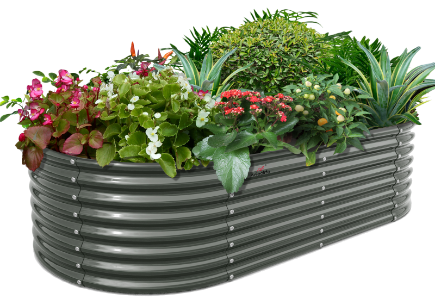Urban farming has become increasingly popular in recent years as people seek to grow their own fresh produce in limited spaces. One of the key innovations driving this trend is the use of raised garden beds. These elevated planting areas offer numerous benefits for urban farmers, from maximizing space to improving soil quality. In this article, we will explore the transformative impact of raised garden beds on urban farming.

The Advantages of Raised Garden Beds
Maximizing space is a critical consideration for urban farmers, and raised garden beds offer an efficient solution. By elevating the planting area, these beds allow for better organization and utilization of space. They also provide easier access for planting, weeding, and harvesting, making them ideal for small urban gardens or even rooftop farms. In addition, raised garden beds can help to minimize soil compaction and erosion, leading to healthier and more productive crops.
Improving Soil Quality
One of the key factors in successful urban farming is the quality of the soil. Raised garden beds enable farmers to have greater control over the soil composition, drainage, and fertility. By filling the beds with high-quality soil, compost, and other organic amendments, urban farmers can create an optimal growing environment for their plants. This is particularly beneficial in areas where the native soil may be poor or contaminated, allowing for the cultivation of a wider variety of crops.
Maximizing Space: How Raised Garden Beds are Transforming Urban Farming
Another significant advantage of raised garden beds is their adaptability to various gardening techniques. From traditional row planting to square foot gardening and intensive planting methods, these beds can accommodate a range of approaches to maximize space and yield. This flexibility is especially valuable in urban settings where every square inch of land is precious. Urban farmers can use raised garden beds to grow a diverse array of fruits, vegetables, herbs, and flowers, effectively transforming small urban spaces into productive gardens.
Environmental Benefits
In addition to their practical advantages, raised garden beds also offer environmental benefits for urban farming. By promoting efficient water usage, reducing the need for chemical pesticides and fertilizers, and supporting biodiversity, these beds contribute to sustainable and eco-friendly gardening practices. They can also serve as a means of urban beautification, adding greenery and natural elements to urban landscapes while mitigating the urban heat island effect.
In conclusion, raised garden beds are revolutionizing urban farming by maximizing space, improving soil quality, and promoting sustainable gardening practices. Their adaptability, efficiency, and environmental benefits make them an invaluable tool for urban farmers seeking to cultivate fresh, healthy produce in limited spaces. As the global trend towards urbanization continues, raised garden beds will play an increasingly vital role in ensuring food security and promoting green living in urban areas.



